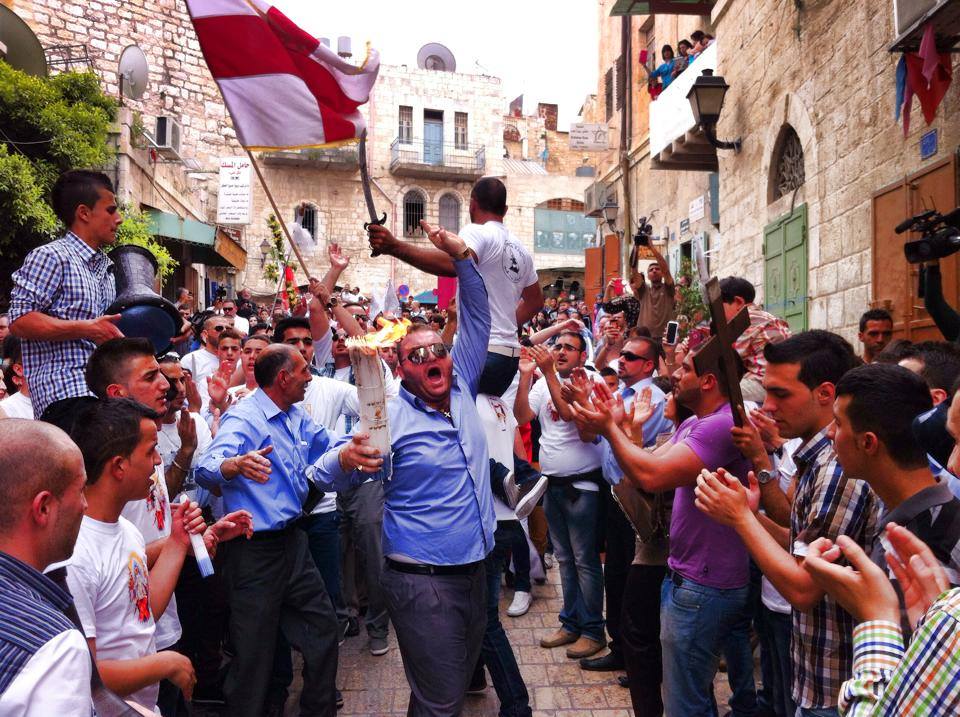Originally published by Ma’an News Agency on April 19, 2014.
 Thousands of Palestinian Christians marched in cities and villages across the Holy Land on Saturday to receive the holy fire as it arrived from the Church of the Holy Sepulchre in Jerusalem.
Thousands of Palestinian Christians marched in cities and villages across the Holy Land on Saturday to receive the holy fire as it arrived from the Church of the Holy Sepulchre in Jerusalem.
Known as “Holy Saturday,” or “Saturday of Light” in Arabic, the festival immediately preceding Easter is marked with particular fervor in the region of Bethlehem. On Saturday, hundreds filled the streets of the city of Jesus’ birth to greet the fire and march to the Church of the Nativity in the city’s historic center.
Holy Saturday marks the day following Good Friday, when Christians believe Jesus Christ was crucified in Jerusalem, and the day before Easter, which marks his resurrection from the grave.
Palestinian Christians as well as Eastern Orthodox Christians from around the world believe that on the Saturday between these two holidays, a miraculous fire appears above his tomb in the Church of the Holy Sepulchre.
Every year, thousands gather in Jerusalem’s Old City to welcome the fire, which is subsequently brought to churches in Palestinian towns and villages throughout the Holy Land.The holy fire is also distributed to Eastern Orthodox churches throughout the world.
For the 200,000 Palestinian Christians, Holy Saturday is an important celebration of community and faith that unites Christians of all sects and ties them to their holy sites in East Jerusalem, which has been occupied by Israel since 1967.Hundreds marched on Saturday in the streets of Bethlehem chanting “Peace upon the Virgin, Mother of the Light,” and other slogans celebrating both their religious and community identities.

These celebrations were joined by worshipers from all over the world, and in particular Coptic Egyptian pilgrims. Although Coptic Pope Shenouda III condemned any pilgrimages to Jerusalem while it was under occupation, since his death in 2011 the number of Coptic pilgrims who visit Palestine has increased. 
In Jerusalem’s Old City on Saturday, Israeli troops and police blocked all entrances to the Church of the Holy Sepulchre to journalists and foreign pilgrims, preventing thousands of Christians from participating in the ceremony. In recent years, Christian celebrations in Jerusalem have been subject to intense Israel restrictions, as checkpoints have been erected through the Old City and worshipers have been subjected to police brutality during their gatherings.
In 2013, Israel even issued an official apology to Egypt after video footage captured a Coptic priest being brutalized by Israeli police.
The system of permits that Israel enforces on all Palestinians in the West Bank, including more than 50,000 Christian Palestinians, also severely restricts their mobility, as many are denied the ability to visit Jerusalem during the Holy Week and throughout the year.
As a result of these restrictions, local celebrations in West Bank cities like Bethlehem have become increasingly important in recent years, symptomatic of the larger fragmentation of Palestinian communities by Israeli obstacles to freedom of movement. In a report published in 2012, the US State Department highlighted Israeli policies restricting freedom of worship for Palestinian Christians and Muslims.
In a report published in 2012, the US State Department highlighted Israeli policies restricting freedom of worship for Palestinian Christians and Muslims.
“Strict closures and curfews imposed by the Israeli government negatively affected residents’ ability to practice their religion at holy sites, including the Church of the Holy Sepulchre and Al-Aqsa Mosque in Jerusalem, as well as the Church of the Nativity in Bethlehem,” the report said.
“The separation barrier significantly impeded Bethlehem-area Christians from reaching the Church of the Holy Sepulchre in Jerusalem and made visits to Christian sites in Bethany (al-Eizariya) and Bethlehem difficult for Palestinian Christians who live on the Jerusalem side of the barrier.”East Jerusalem, including the historic Old City, was occupied by Israeli forces in 1967 and later annexed in a move not recognized by the international community.